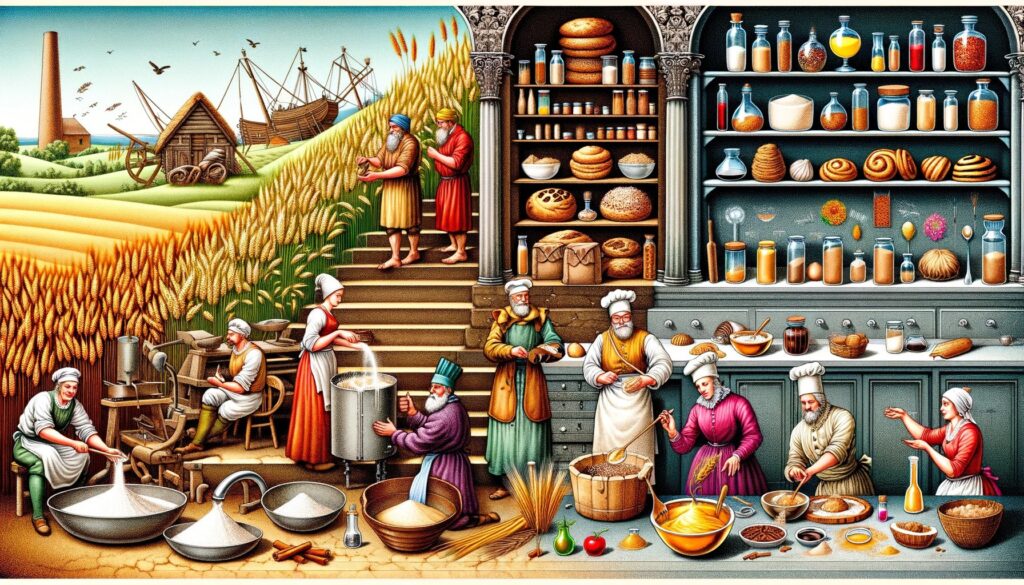Introduction: Baking is an art form that has been perfected over millennia, evolving from humble beginnings with ancient grains to the sophisticated delicacies of today’s culinary world. From simple flatbreads cooked over an open flame to intricate pastries crafted with precision, the history of baking is a testament to human ingenuity and creativity. Let’s embark on a journey through time to explore the rich and diverse history of baking.
The Birth of Baking: The origins of baking can be traced back to ancient civilizations, where early humans discovered the transformative power of fire. The invention of pottery around 10,000 years ago allowed for the creation of rudimentary ovens, paving the way for the development of baked goods. In ancient Mesopotamia, around 3000 BCE, evidence suggests that flatbreads made from barley and wheat were among the first baked goods ever produced. These simple breads provided sustenance to early societies and became a staple food across the ancient world.
The Rise of Leavened Breads: One of the most significant advancements in the history of baking was the discovery of leavening agents. Around 2000 BCE, the Egyptians stumbled upon the fermentation process, leading to the creation of leavened bread. By incorporating yeast into their dough, they were able to produce lighter, fluffier bread with a distinct flavor. This innovation revolutionized baking and laid the foundation for the diverse array of breads we enjoy today.
The Influence of Ancient Greece and Rome: The ancient Greeks and Romans further refined the art of baking, introducing new ingredients and techniques to enhance flavor and texture. In Greece, honey was commonly used as a sweetener in baked goods, while the Romans experimented with different grains and additives such as eggs and cheese. The Roman Empire’s extensive trade networks facilitated the spread of baking throughout Europe, influencing culinary traditions across the continent.
The Middle Ages and the Age of Exploration: During the Middle Ages, baking took on religious significance, with monasteries becoming centers of culinary innovation. Monks perfected recipes for bread and pastries, often incorporating spices and fruits imported from distant lands. The Age of Exploration in the 15th and 16th centuries brought new ingredients to Europe, such as sugar, chocolate, and exotic spices, transforming baking into a luxurious indulgence enjoyed by the elite.
The Industrial Revolution and Modern Baking: The Industrial Revolution marked a turning point in the history of baking, with the invention of mechanized equipment and mass production techniques. Steam-powered ovens and commercial bakeries revolutionized the way bread and pastries were made, making them more accessible to the general population. The 20th century saw further advancements in baking technology, including the invention of instant yeast, pre-packaged mixes, and convection ovens, allowing for greater precision and consistency in baking.
The Artisanal Revival: In recent years, there has been a resurgence of interest in artisanal baking, fueled by a desire for authentic, handcrafted products made with high-quality ingredients. Artisan bakers are rediscovering traditional techniques and recipes, while incorporating modern twists to create unique and innovative baked goods. From sourdough bread made with ancient grains to delicate French pastries, artisanal baking celebrates the rich heritage of the craft while embracing innovation and creativity.
Conclusion: The history of baking is a testament to the human quest for nourishment, flavor, and creativity. From its humble beginnings with ancient grains to the sophisticated delicacies of today, baking has evolved into an art form that transcends cultural boundaries and spans centuries of innovation. Whether it’s a simple loaf of bread or an elaborate wedding cake, baking continues to bring joy and satisfaction to people around the world, connecting us to our past while inspiring future generations of bakers.
